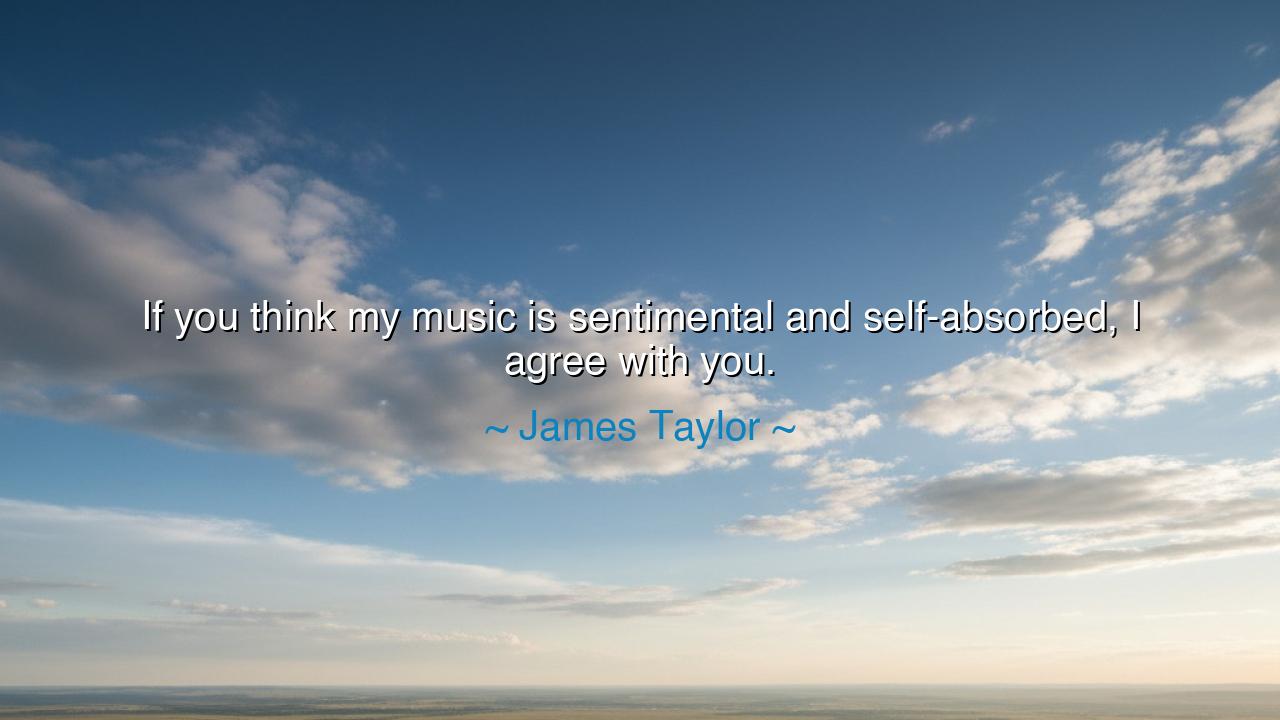
If you think my music is sentimental and self-absorbed, I agree






Hear the words of James Taylor, who declared with disarming honesty: “If you think my music is sentimental and self-absorbed, I agree with you.” In this confession lies a paradox of wisdom, for he admits without shame what critics accuse him of, and in doing so he transforms weakness into strength. His words remind us that art, when true, must flow from the depths of the self—even when it appears vulnerable, even when it risks being misunderstood. For what some call sentimental may, to another, be the very language of the heart.
The ancients taught that the poet’s duty was not to flatter the crowd but to speak the truth of his own soul. To be self-absorbed in this sense is not vanity, but courage: the willingness to descend into one’s own depths and bring back what others fear to confront within themselves. James Taylor’s music, like the hymns of ancient bards, is confession made melody, an invitation for listeners to find their own lives mirrored in his. In admitting to sentiment, he embraces the very essence of what makes art human—its power to feel deeply and to move others to feel as well.
Consider the story of Vincent van Gogh, whose paintings were once dismissed as excessive, too emotional, too unrefined. Critics mocked his bold colors and unsteady strokes, calling them unskilled, even mad. Yet Van Gogh persisted, painting the storm inside his heart, pouring sentiment and self into every canvas. Only after his death did the world understand that his vulnerability was not weakness but genius. Like Taylor, he accepted the charge of sentimentality, for he knew that only by exposing his soul could he touch the souls of others.
Taylor’s quote is also a quiet rebuke to the critic, who often demands distance, restraint, and cleverness in place of raw emotion. But the human heart does not live by cleverness alone. It yearns for tenderness, for confession, for songs that speak not of lofty abstractions but of longing, love, loss, and healing. To agree with the critic, as Taylor does, is to disarm him: “Yes, I am sentimental. Yes, I am self-absorbed. But in this, I am true. And in my truth, you may find yourself.”
This truth carries a profound lesson for all who create and all who live. We are taught to hide our sentiment, to cloak our inner struggles, to fear the judgment of others. Yet it is precisely when we allow ourselves to be seen, even in our most vulnerable states, that we become most powerful. Sentiment is not weakness—it is the bridge between souls. To share your inner world, even at the cost of seeming self-absorbed, is to offer others the chance to recognize themselves in you.
To you who hear this, take courage from Taylor’s humility. If you are accused of being too emotional, too personal, too vulnerable—perhaps you are on the right path. For it means you are not hiding behind masks; you are daring to bring your truest self into the world. Whether through song, speech, writing, or action, let your work reflect your heart, even if it trembles. For the heart, once shared, becomes a beacon to others who struggle in silence.
Practical wisdom follows: do not fear criticism that mocks your depth. Instead, ask yourself: Is my work honest? Is it true to my experience? If the answer is yes, then let the critics say what they will. Their words may pass, but your truth will endure. Continue to create, continue to share, and know that somewhere, someone will hear your song and feel less alone.
Thus, remember James Taylor’s words: “If you think my music is sentimental and self-absorbed, I agree with you.” In this acceptance lies freedom—the freedom to create without apology, to live without fear of judgment, and to know that the greatest gift you can give is not perfection, but authenticity. For in sentiment, there is humanity; and in humanity, there is the power to heal.






AAdministratorAdministrator
Welcome, honored guests. Please leave a comment, we will respond soon